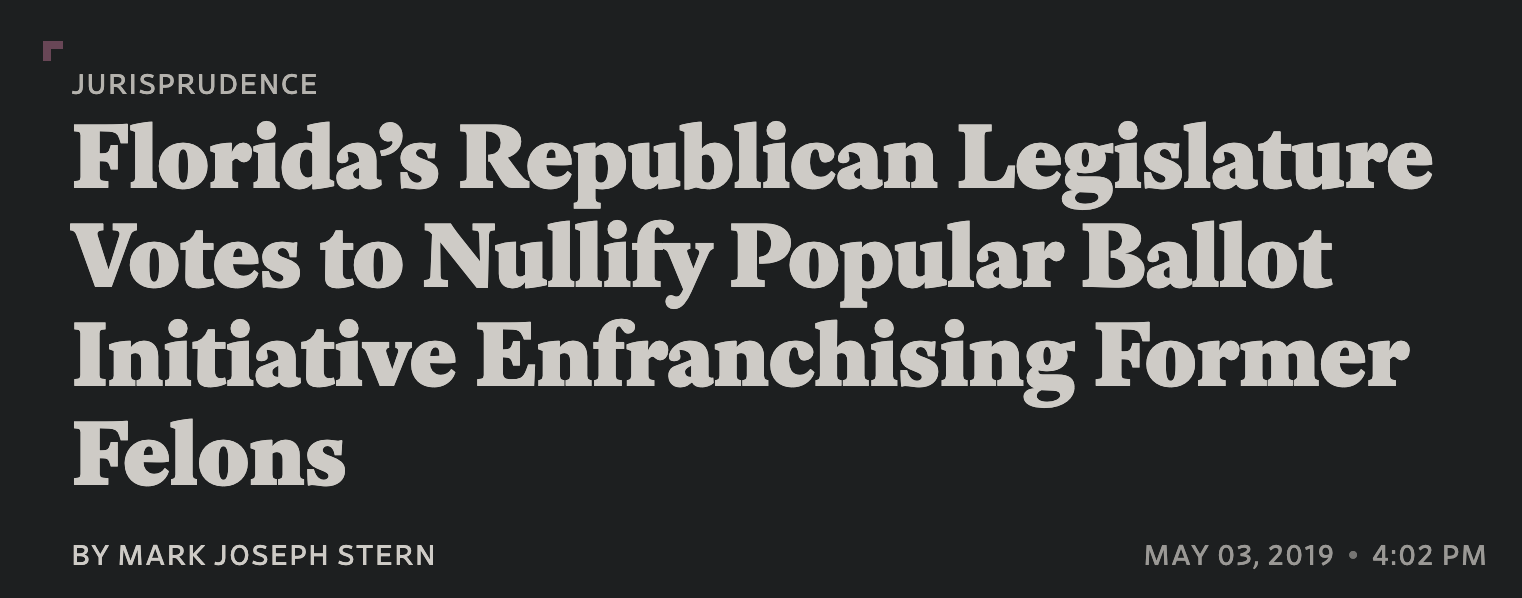this is not democracy manifest
Apr 08 2024
politics
The best way to radicalize someone against democracy is to tell them that America is one.
If there is anything I have learned in the last few years, it is that ideology is largely defined not by the presence of ideas but by the absence of ideas. For example, I recently read an Orlando Sentinel article with the alarming headline “A poll asked voters if democracy is the ‘best system.’ Then came all the unexpected responses.”
I figured this article would express all of the standard liberal anxieties about American politics since 2016 - and it definitely does express those things. The poll asks several questions, most of which are narrowly about political preferences around the 2024 election, but the two questions relevant for us today are these:
- “On the whole, how satisfied or dissatisfied are you with the way democracy works in the United States?”
- Agree or disagree: “Democracy may have problems, but it is the best system of government (all voters)“
The “unexpected responses” in the Sentinel article refer to the unusually high number of voters from age 18-35 who “disagreed” with question two (25%). Frankly, I’m not all that surprised with that result, but even if it was 100%, the result would not be relevant for our purposes today. That’s for one reason: at no point in this article or in the poll it covers is there a definition of “democracy.”
Defining “democracy” may admittedly be a tall ask for one Sentinel article, but one must assume that if the Sentinel thought this result was significant enough to publish they must have some clear idea of what it means, but they don’t outline what it is. It’s here where we find the unspoken idea: the American system of government is, or at least was, democratic in nature. There is one problem with this idea: it is completely wrong.
It’s far from an original observation, but America was a slave republic for 89 years (1776-1865), and then an archipelago of apartheid states that deprived non-whites of political rights for a hundred more (1865-1965), which is to say nothing of the fact that even universal suffrage for white men was not fully institutionalized until the Civil War. All this means that if we take democracy to mean “a society where every person who is subject to the rule of the state has input in selecting it’s leaders,” American democracy by this definition began with the passage of the Voting Rights Act of 1965 at the absolute earliest, making it an institution that is 59 years old at time of writing. My grandmother is older than American democracy.
But the historical questions around slavery and Jim Crow are just the tip of the iceberg when considering the extent of American “democracy,” because we haven’t even discussed the nature of the political system as it currently exists. If we take democracy to mean “a society where the state is obliged to obey the popular will,” then the U.S. fails to meet this metric yet again. Again, an incomplete list of our anti-majoritarian institutions include the Electoral College, the monstrous power imbalance between rural and urban voters created by the Senate, and the all-powerful, unelected Supreme Court that claimed supreme authority over interpretation of the Constitution unilaterally. And, as a reminder, the majority of the justices currently serving on it were appointed by presidents who did not win the popular vote in their first term!. These institutions did not become bulwarks against the popular will by accident - their subversion of democracy is a feature, not a bug. With all this in mind, what exactly does it mean to ask Americans how they feel about “democracy” when American “democracy” has thus far looked like this:

I could write a much longer piece on the ways in which the constitutional system and the slapdash scaffolding we’ve constructed around it are inefficient, unsustainable, and virulently anti-democratic, and indeed that essay has already been written by a man of greater stature than I. Instead, I bring up these points today because it is extraordinarily important to remember that the American constitutional system is and has historically been profoundly anti-democratic - which means that, any problems you have with it cannot be attributed to the concept of “democracy.”
If you get it in your head - as many Americans have - that our byzantine federalist system where the government regularly spends tens of millions of dollars suing itself is “democracy”, that a system where state authority is scattered among enough criss-crossing fiefdoms to rival the Holy Roman Empire is “democracy”, that a country where 90% of the inmates in the largest prison in the largest city have not been convicted of a crime is “democracy” - you very well might lose faith in democracy. But democracy didn’t get America in this situation - and it’s worth thinking about why someone might try to convince you that it did.

